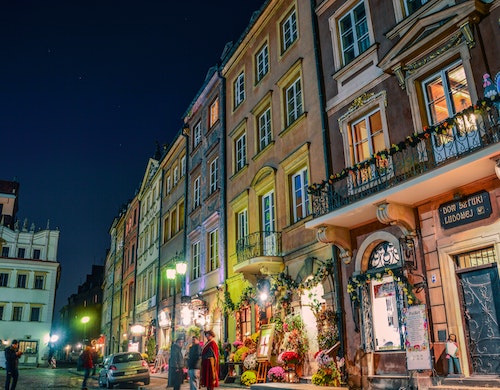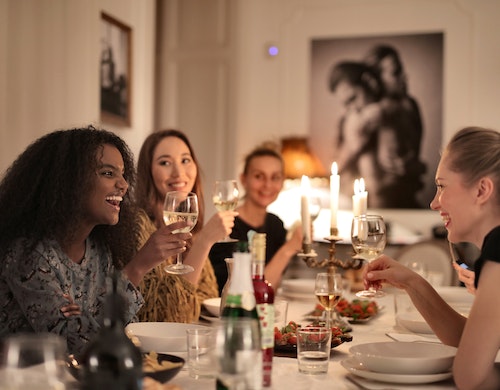The Perfect Polish Phrase for Every Occasion
If you're planning on traveling to Poland or just want to impress your Polish friends, knowing the perfect Polish phrase to use in a few key situations can take you a long way.
Whether you're shopping for souvenirs, ordering food at a restaurant, or just trying to make some new friends, here are some useful Polish phrases for every occasion.
Table of Contents
→Sign Up Now: Free Trial Polish Lesson With a Native Teacher!←
Common Phrases in Polish: Getting by in Poland
Poland is a fascinating country. But if you don't know the local language, it can be intimidating to try to get by. Here are some essential phrases that will help you navigate basic communicative situations in Poland.
What is the best Polish phrase to say Hello?
There are a few ways to say "hello" in Polish, but the most common one is "cześć" (pronounced "cheh-sh-ch"). It's informal and can be used in both casual and formal situations.
If you want to be a little more formal, you can say "dzień dobry" (pronounced "jen dob-ry"), which means "good day."
Looking for different options? Try one of these:
- Dzień dobry ➜ Good morning / Good afternoon
- Cześć co tam? ➜ Hi, what's up?
- Witam, jak się masz? ➜ Polish for ‘Hello, how are you?’

Image by Andrea Piacquadio, via Pexels
What is the best Polish phrase to say Goodbye?
When it's time to say goodbye, you can say "do widzenia" (pronounced "do veet-zen-ya"), which means "goodbye." It's a formal phrase that can be used in any situation.
If you're in a more casual setting, you can opt for "na razie" (pronounced "na ra-zheh"), which means "see you later."
Are you looking for more specific Polish greetings? Here are a few other options:
- Do zobaczenia jutro ➜ See you tomorrow
- Do zobaczenia w przyszłym tygodniu ➜ See you next week
- Miłego dnia ➜ Have a nice day
- Miłego weekendu ➜ Have a nice weekend
What is the best Polish phrase to say Thank you?
Has someone just done something nice for you? To express your gratitude, you can say "dziękuję" (pronounced "jen-koo-yeh"), which means "thank you."
If you want to be a little more casual, you can say "dzięki" (pronounced "jen-kee"), which is like saying "thanks" in English.
You can also try any of these Polish idioms:
- Wielkie dzięki ➜ Thanks a lot
- Naprawdę doceniam to, co zrobiłeś ➜ I really appreciate what you did
- To jest dla mnie całym światem ➜ This means the world to me
What is the best Polish phrase to say Sorry?
Have you made a mistake or accidentally bumped into someone? No worries. Polish people are very relaxed when it comes to other people’s mistakes. Just say "przepraszam" (pronounced "psheh-prash-am"), which is a polite and formal way of saying "sorry", and you will be all right.
If you want to be more casual, you can say "przepraszam bardzo" (pronounced "psheh-prash-am bar-dzo"), which means "I'm very sorry" but is actually more informal.
Other ways to apologize in Polish include:
- Bardzo mi przykro z powodu tego, co się stało ➜ I'm verry sorry about what happened.
- Chciałbym przeprosić ➜ I want to apologise.
- Czy mógłbyś mi wybaczyć? ➜ Would you forgive me?
Common Phrases in Polish for Tourists
Now that you know what the Polish "Hello, how are you?" and "Thank you" look like, let's take a look at some specific phrases that can come in handy while shopping, eating out, or just exploring the city.

Image by Caio, via Pexels
Shopping
If you're shopping for souvenirs or gifts, you can say "ile to kosztuje?" (pronounced "ee-leh toh kosh-too-yeh"), which means "how much does this cost?"
Too expensive? Try your luck by saying "czy można zrobić lepszą cenę?" (pronounced "chi mo-zha-na zro-bich lep-shoo che-nuh"), which means "can you give me a better price?". You have nothing to lose!
Oh, and if you want to go clothes shopping, you may also want to study the following phrases in Polish:
Czy można to przymierzyć? ➜ Can I try this on?
Czy jest w innym kolorze? ➜ Is it available in another colour?
Jakie są rozmiary? ➜ What sizes do you have?
Gdzie jest przymierzalnia? ➜ Where is the changing room?
Eating out
If you're dining out, you can always start by saying "poproszę menu" (pronounced "pop-roh-sheh meh-noo"), which means "can I have the menu, please?"
Then, once you're ready to order, you can use the phrase "chciałbym/chciałabym zamówić" (pronounced "h-chah-w-bim/zha-wah-bim za-muh-vich"), ("I would like to order") to begin your culinary adventure.
Would you like to do the whole ritual in Polish? Then make sure you use the following phrases:
- Wystąpił problem z moim zamówieniem ➜ There's a problem with my order.
- Czy mogę prosić o uzupełnienie? ➜ Can I have a refill?
- Poproszę o rachunek ➜ Can I have the bill, please?
- Czy mogę dostać togo do wynosu? ➜ Can I have this take-away?
Asking for help
There may come a time during your stay in Poland when you need to ask for help. If this happens, don't worry - the Poles are wonderful people who will gladly lend a helping hand!
If you need some assistance, you can say "przepraszam, czy możesz mi pomóc?" (pronounced "psheh-prash-am, chi mo-zhesh mi po-moots?"), which means "excuse me, can you help me?"
Do you need directions? Then you can say "jak dojść do..." (pronounced "yahk doyshch doh..."), which means "how do I get to..."
Looking for a specific Polish phrase not on this list? See if you find it here:
- Gdzie jest najbliższy...? ➜ Where is the nearest...?
supermarket (supermarket)
hotel (hotel)
bar (bar)
bankomat (cash machine)
Apteka (pharmacy)
Biuro Informacji turystycznej (tourist office)
stacja benzynowa (petrol station)
- Czy możesz pokazać mi na mapie? ➜ Can you show me on the map?
- Czy mówisz po angielsku? ➜ Do you speak English?
Polish Phrases for Socialising
Getting to know other people is one of the most rewarding aspects of travelling abroad. Especially when you travel alone! If you are in Poland and you're in the mood for some socialising, it helps to know a few basic phrases in Polish.

Image by Andrea Piacquadio Pexels
Here are the essentials:
Talking about family
Polish people value their families, so it's not uncommon to hear someone talk about their loved ones. If you want to ask someone about their family, you can say "jak się mają twoi rodzice?" (pronounced "yahk shay mohng t-voi roh-dzit-seh"), which means "how are your parents doing?"
Oh, and if you want to ask about brothers and sisters, you can say "czy masz rodzeństwo?" (pronounced "chi mahsh rod-zhent-shtvo"), to mean "do you have siblings?"
You can also use any of the following:
- Czy jesteś żonaty? ➜ Are you married?
- Jak zbudowana jest Twoja rodzina? ➜ How is your family composed?
- Gdzie mieszkają wasze dzieci? ➜ Where do your children live?
- Czy masz dużą rodzine? ➜ Do you have a big family?
Flirting
If you're interested in someone and want to flirt a little, you can say "jesteś bardzo atrakcyjny/atrakcyjna" (pronounced "yes-tesh bar-dzo ah-trak-tiv-ny/ah-trak-tiv-na"), which means "you're very attractive."
Or maybe you want to ask someone out. In that case, just say "czy chciałbyś/chciałabyś iść ze mną na randkę?" (pronounced "chi h-chahw-bish/ h-chahw-bi-sh eesh zhe mnauh na rand-kuh"), which means "would you like to go on a date with me?"
Do you want to go the extra mile? Try any of these Polish phrases for flirting:
- Masz piękne oczy ➜ You have beautiful eyes.
- Chciałbym spędzić z tobą więcej czasu ➜ I'd like to spend more time with you.
- Pójdziemy w jakieś ciche miejsce? ➜ Shall we go somewhere quiet?
Making friends
If you want to talk to locals but you're not in a romantic mood, why not try making friends?
Making Polish friends is a great way to practise the language and get to know the culture. Plus, if the relationship continues after your departure, you'll always have someone to visit in Poland!
If you've just spotted someone who looks friendly and you want to break the ice, you can say "nazywam się..." (pronounced "na-zivam-sheh"), which means "my name is..." And if you want to ask someone to hang out, you can say "czy chciałbyś/chciałabyś się spotkać i porozmawiać?" (pronounced "chi h-chahw-bish/ h-chahw-besh sheh spot-ketz i po-rohz-mov-yat-s"), which means "would you like to meet and chat?"
If the Polish phrase you need is not in the introduction, maybe one of these can help you:
- Czy możesz wyjść dziś wieczorem? ➜ Are you free to go out tonight?
- Jakie są Twoje zainteresowania? ➜ What are your hobbies
- Opowiedz mi o swojej pracy ➜ Tell me about your job
- Jak się tu mieszka? ➜ What's it like to live here?
Learn Polish Now
No matter what your purpose is in Poland, it's important to remember that communication is key. And one of the best ways to communicate with locals is to use at least one Polish phrase in every interaction.
Having a few basic expressions up your sleeve can make all the difference in making friends and having a wonderful time when you visit Poland. So, get ready to practise some Polish and enjoy your stay!
As you may have noticed, one of the trickiest aspects of the Polish language is its pronunciation. If you need help with that, don't hesitate to reach out to us for help.
→Sign Up Now: Free Trial Polish Lesson With a Native Teacher!←
At isten & Learn, we work with native Polish teachers who can help you learn the language in no time. And if you are short on time, we also offer intensive online courses with lots of speaking activities so you can prepare for your visit to Poland quickly and easily.
So, what are you waiting for? Don't wait any longer! Start learning with one of our tailor-made Polish courses.


